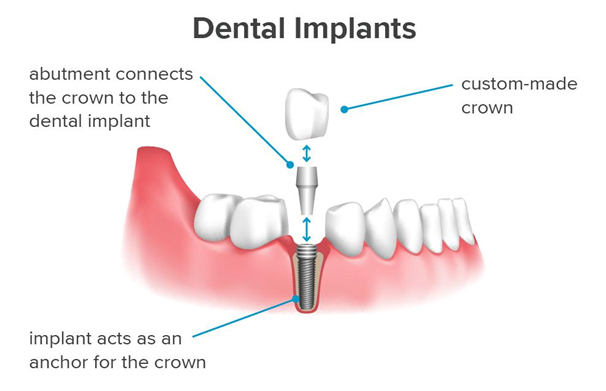What are dental implants?
A dental implant is a prosthetic tooth that is used to replace a lost tooth. The surgeon implants a screw-like device into the jawbone, which functions as an anchor for a prosthetic tooth called a crown.
The artificial tooth is connected to the dental implant through a device called an abutment.
Custom-made crowns are constructed to suit the individual’s mouth and match the colour of their teeth. Crowns mimic the appearance, feel, and function of natural teeth.
Implants provide several benefits overdentures, which are removable prosthetic teeth,

Implants:
- are more natural and comforting.
- Have a greater rate of success.
- Enhance the chewing function.
- Result in a decreased chance of acquiring cavities in adjacent teeth.
- Resulting in improved bone maintenance at the location of the missing tooth.
- Resulting in reduced sensitivity in adjacent teeth.
- Do not need removal and cleaning each night.
Dental implants, on the other hand, are not appropriate for everyone. Due to the fact that the implanting devices must bind with the jawbone, a patient’s bones must be healthy prior to undergo implant surgery.
PROCEDURE FOR DENTAL IMPLANTS IN VELACHERY
Dental implant placement is a multi-stage process. They are as follows:
Implantation
Modern dental procedures allow for a pleasant and painless implant installation treatment. Concerned patients may also request medication to help them relax throughout the dental implant placement process.
The treatment begins with the preparation of the jawbone, followed by an incision to expose the bone for drilling holes. The holes are maintained deep enough to allow the implant to be correctly inserted and penetrate deep into the bone, similar to the root.
In circumstances when the bone is too weak or insufficiently strong to sustain implant surgery, the doctor may recommend bone grafting. The surgeon then waits for the jawbone to heal completely before inserting the metal post.
From beginning to end, the whole procedure may take several months, with the majority of that time spent recovering and waiting for new bone to form in the jaw.
Following that, the patient is given a temporary crown to bridge the gap and get the desired cosmetic result. This crown may be removed for implant placement; however, one must wait until the bone has healed completely.
Healing
The jawbone will develop and fuse with the surface of the dental implant throughout this procedure. This procedure is sometimes referred to as osseointegration since it provides a stable foundation for the new artificial tooth, just as natural teeth roots do.
This procedure typically takes between three and six months, depending on the bone quality and shape. However, when patients have a healthy bone structure, the whole treatment may be finished in a single day.
Following that, the second operation may be scheduled, but only when the implants have bonded with the bone. Your dentists will do an x-ray to determine the implant’s suitability for the second procedure.
The second procedure will be less invasive since a fresh incision will be created to expose the implant heads.
Placement of Abutment
You may need further surgery to insert the abutment (the component to which the crown will be attached), but only after the gums have healed completely. This operation is extremely straightforward and is often performed under local anaesthesiain an outpatient environment.
The dentist will reopen the incision during the surgery to connect the abutment to the dental implant. For 4 to 6 weeks, a temporary crown will be placed to allow the gums surrounding the abutment to recover. This kind of crown is softer, which cushions the implant and may cause stress on the soft tissues, which aid in healing.
You may be required to consume only soft foods after each step of surgery as a precaution to allow the surgical site to recover correctly.
Implantation Of A Permanent Crown
The dentist will next work on making the permanent crown seem identical to your natural teeth. All features, including the surface texture, colour, and morphology, will be adjusted to mix in with the adjacent dentition.
If you are dissatisfied with the crown for any reason, visit your dentist to have it returned to the dental technician for any adjustments.
To create the crown, impressions of your mouth and remaining teeth are obtained in order to create a realistic-looking prosthetic tooth. The crown, on the other hand, will not be implanted until the jawbone has developed sufficient strength to hold the new tooth.
A permanent crown is created in less than two to three weeks and is then glued or screwed to the implant.
Following the insertion of the permanent crown, your doctor will discuss post-implant care instructions with you.
DENTAL IMPLANTS POST-OP INSTRUCTIONS
- Follow the following post-operative guidelines after your Dental Implant operation, and never hesitate to approach your doctor with any questions or concerns:
- On the day before the operation, avoid touching, spitting, or washing the wound. Avoid touching the metal healing abutment that protrudes through the gum tissue.
- For the first 24 hours after implant surgery, minor bleeding or redness in the mouth is common. Bite on a gauze pad (put on the bleeding site) for 30 minutes to reduce excessive bleeding. If the bleeding does not cease, see your dentist for additional advice.
- Swelling is a normal reaction to surgery. Apply an ice pack to the cheek in the surgery region to lessen it (you can also use a plastic bag or an ice-filled towel). Apply as much ice as possible during the first 36 hours.
- Consume plenty of water but avoid hot drinks. On the day before the operation, adhere to a soft diet. Once the surgery region has healed, you may resume your usual diet. Avoid drinking anything using a straw.
- As soon as the local anaesthesia wears off, begin taking pain medicine. Take, however, the medications suggested by your dentist.
- Without proper dental hygiene, healing is impossible. While the day after surgery, take the suggested oral rinse twice – after breakfast and before night. Spit it out after at least 30 seconds of rinsing. Additionally, use warm salt rinses at least 4-5 times each day. Brush the surgery area gently at first to avoid interfering with the healing process.
- After implantation, refrain from using or consuming tobacco products in any shape or manner. Not only does it impede healing, but it may also increase the likelihood of implant failure.
- Avoid exercising shortly after surgery or keep it to a minimum. You should be aware that exercise may result in bleeding or throbbing; if this occurs, immediately cease activity. This may cause you to get weakened as a result of your lack of usual nutrients.
- At the time of implant implantation, healing abutments will be installed. Therefore, thoroughly rinse them and maintain them clean. Allow the sutures to dissolve before gently massaging the abutments.
- Avoid wearing partial or complete dentures or flippers soon after surgery or for at least ten days after that.
Frequently asked Questions
What Is the Life span of Dental Implants?
Dental implants are considered to be quite durable, particularly when properly cared for. They may endure up to 25 years. Consult a dentist at your nearby Luxe Dental Clinic to have dental implants.
Is it Possible to Receive Full Mouth Dental Implants?
Dental implants have emerged as the most promising option for replacing lost teeth. If the majority of all of the teeth in your mouth are missing, treatments such as all-on-four and all-on-six may help you achieve a complete mouth of dental implants using four or six titanium posts in your jaw bone.
Are Dental Implants Unbearably Painful?
While receiving dental implants from a skilled implantologist, the patient will have little to no discomfort. A local anaesthetic is administered as part of the implant preparation process to ensure the patient feels no discomfort.
How Much Do Dental Implants Cost?
At Luxe Dental, patients get the highest level dental care. We guarantee that our patients get the full value of their dental implant investment. Additionally, Luxe Dental acquires solely from authorised manufacturers, ensuring authenticity and quality.





